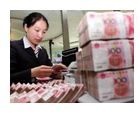
Asian markets mainly fell on Friday, weighed down by jitters over the impact of China’s yuan devaluation and a fall in oil dragged down energy stocks, while Shanghai rose on hopes for more market intervention.
The dollar dipped after advancing on solid US retail figures, which fuelled expectations the Federal Reserve will raise rates soon, while the euro fell on weak EU growth data.
Tokyo ended down 0.37 percent, or 76.10 points, at 20,519.45 and Sydney lost 0.58 percent, or 31.37 points, to 5,356.50. Seoul’s financial markets were closed for a public holiday.
Hong Kong fell 0.13 percent, or 27.77 points, to end the day at 23,991.03.
Asian shares fluctuated throughout the day as investors weighed the impact of a surprise devaluation of the yuan by China this week that has roiled global financial markets.
“The yuan devaluation and prospects of an impending rate increase by the Fed have created a very volatile market environment,” Jonathan Ravelas, chief market strategist at Manila-based BDO Unibank, told Bloomberg News.
“That’s made many investors risk adverse.”
But Shanghai bucked the trend with a rise of 0.27 percent, capping its biggest weekly increase in two months, as investors hoped the surprise devaluation of the yuan heralded more economic support from Beijing.
Adding to those hopes, China’s market regulator pledged after the close to stabilise the volatile stock market for a “number of years” and vowed a longer-term role for state-backed company tasked with buying shares.
The benchmark Shanghai Composite Index gained 0.27 percent, or 10.78 points to 3,965.34, a 5.91 percent rise over the week and its biggest weekly gain in two months.
“The prevailing local view seems to be that the cut was reasonable considering the slowdown in the economy,” Gerry Alfonso, a sales trader at Shenwan Hongyuan in Shanghai, told Bloomberg News.
“There is a perception that the authorities will introduce further measures to support the economy.”
Oil slides
Energy shares took a hit on Friday, leading the slump in Asia as oil prices slid close to their low point for 2015 on signs that a global glut of supplies will last into next year.
US benchmark West Texas Intermediate (WTI) for September delivery dropped 20 cents to $42.03 in afternoon trade, the lowest price since March 2009.
Brent crude for September, which expires Friday, eased four cents to $49.21, remaining below $50 a barrel.
Australia’s third-largest crude producer tumbled 8.97 percent to Aus5.99, while in Hong Kong CNOOC lost 2.59 percent to HK$9.76 and PetroChina sank 2.29 percent to HK$7.26.
“It’s concerning that we can’t really see the bottom of oil prices,” Hitoshi Asaoka, Tokyo-based senior strategist at Mizuho Trust & Banking Co., told Bloomberg News.
Elsewhere Chinese computer maker Lenovo fell 5.84 percent to HK$7.25 after Fubon Securities and Macquarie downgraded their ratings.
Wall Street had finished little changed Thursday in choppy trade as retail sales beat expectations, adding to hopes the US may raise interest rates for the first time in almost a decade.
In Tokyo, the greenback changed hands at 124.26 yen, down from 124.43 yen in US trading, while the euro traded sideways at $1.1151 from $1.1152.
The 19-nation single currency fell to 138.57 yen, against 138.77 yen in New York.
The euro exchanged hands at 138.58 yen compared with 138.77 yen in US trade after disappointing growth figures from the EU’s top economies.
Safe-haven gold fetched $1,118.45, compared to $1,121.23 late Thursday.
In other markets:
Wellington fell 0.72 percent, or 41.25 points, to 5,696.45.
Spark New Zealand closed down 2.56 percent at NZ$2.66 and Meridian Energy lost 2.04 percent at NZ$2.16.
Taipei closed flat, losing 6.1 points to 8,305.64.
Smartphone maker HTC rose 2.76 percent to Tw$52.10 while Hon Hai Precision Industry gained 1.49 percent to Tw$88.70.
Jakarta ended flat, adding 1.141 points to 4,585.39.
Oil and gas company Elnusa gained 8.60 percent to 341 rupiah, while apparel manufacturer Pan Brothers fell 7.02 percent to 530 rupiah.
Singapore closed 0.73 percent, or 22.47 points, higher at 3,114.25.
United Overseas Bank advanced 1.13 percent to Sg$20.58 and property developer CapitaLand fell 1.26 percent to Sg$3.14.
Kuala Lumpur fell 1.53 percent, or 24.80 points, to close at 1,596.82.
RHB Capital lost 2.18 percent to 6.72 ringgit, Malayan Banking dipped 3.60 percent to 8.29 ringgit while Telekom Malaysia added 0.48 percent to 6.33 ringgit.
Bangkok added 0.70 percent, or 9.77 points, to 1,413.92
Bumrungrad Hospital, a popular medical tourism destination, soared 6.73 percent to 222.00 baht, while Siam Cement slipped 0.38 percent to 520.00 baht.
Mumbai rose 1.88 percent, or 517.78 points, to 28,067.31 points.
Miner Vedanta Limited rose 3.73 percent to 107.20 rupees, while drug maker Dr Reddy’s Laboratories fell 0.75 percent to 4,258.05 rupees.



